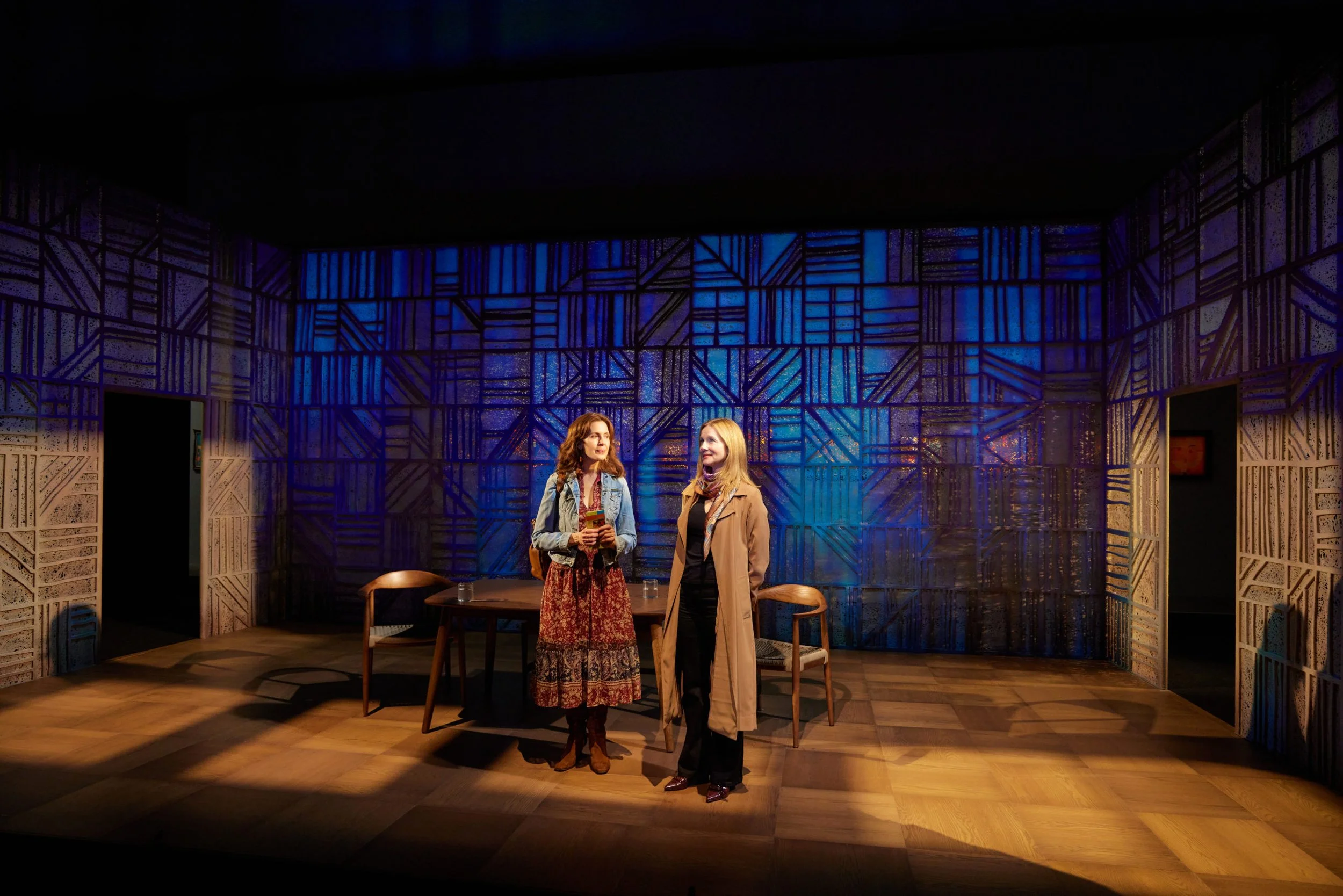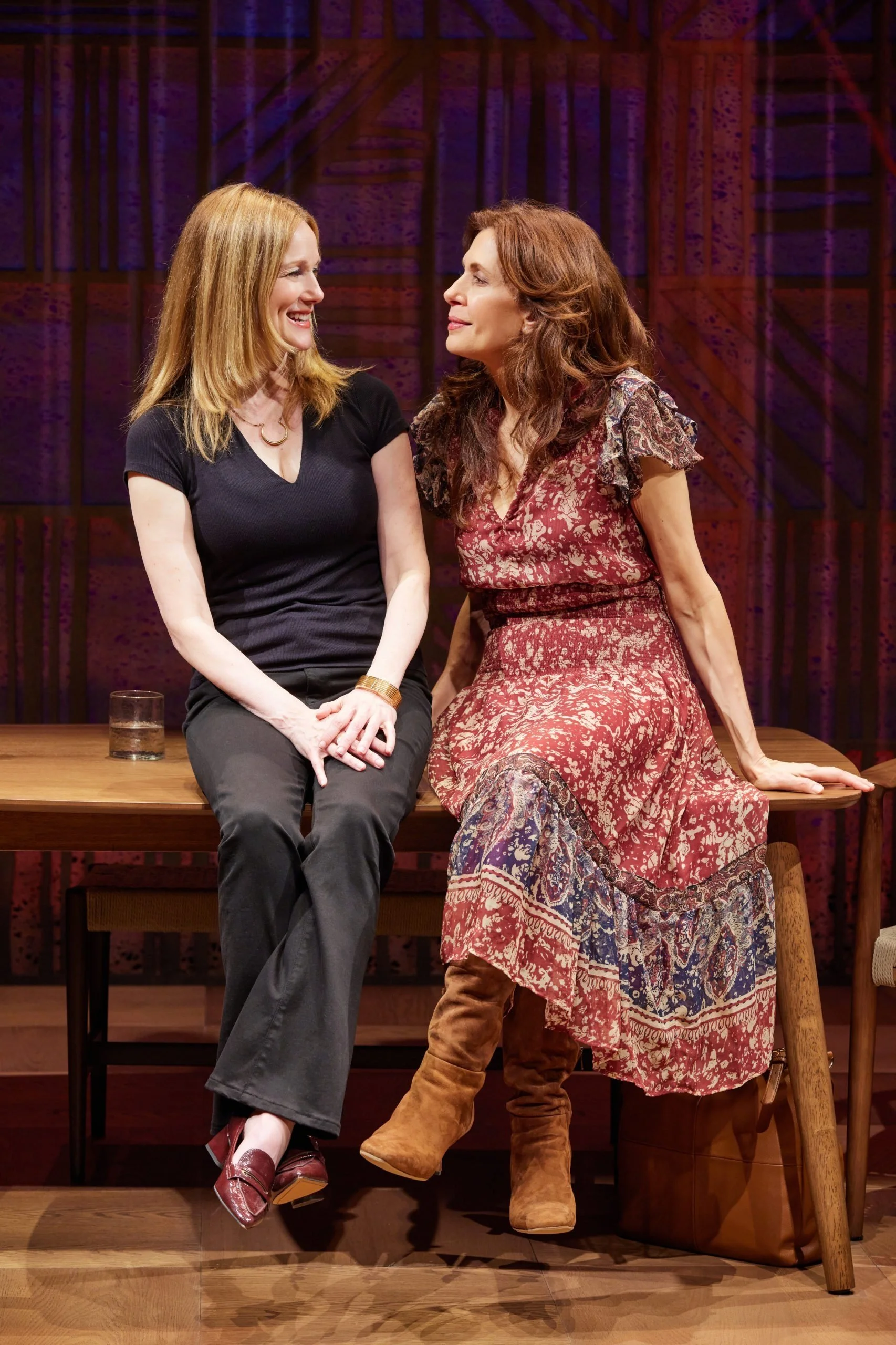Summer, 1976
Jessica Hect and Laura Linney in Summer, 1976.
Photo by Jeremy Daniels.
“Opposites attract” is one of many clichés about human nature that is both overused and tried. It is also one of the many possible clichés that Summer, 1976, the new play by David Auburn playing at the Samuel J. Friedman Theatre, gracefully avoids.
A two-hander memory play chronicling the unlikely friendship between a pair of women in Columbus, Ohio, during the bicentennial season, Summer 1976 is a refreshingly simple, surprisingly poignant, offering from the Manhattan Theatre Club, coming at the conclusion of a Broadway season filled with sparkle and splash. Under Daniel Sullivan’s subtle direction, and starring two outstanding actresses, the disarmingly slight play leaves a surprisingly heavy impact.
Linney plays Diana, an associate professor and frustrated artist, while Hecht plays Alice, whose flighty exterior masks hidden depth and desperation. Seated onstage in John Lee Beatty’s set, the two serve as dual narrators from decades in the future, remembering and reflecting on an unexpectedly eventful summer.
“I sort of immediately hated her,” Alice tells the audience about Diana, while Diana describes her first impression of Alice as “a sleepy-eyed little hippie with her shorts and her coconut oil” who “only thought she was unconventional because her house was messy.” Meeting as many parents do through a playdate for their young daughters, the pair embark on a friendship that begins with a shared joint and develops to include supporting each other through marital discord and mutual dissatisfaction.
Diana is a single mother, secure thanks to family money, who can’t seem to finish any of the art projects she begins. Her clothes are sleek and black, and her house is orderly. Her brittle perfectionism serves as a filter for her unfulfilled ambitions. Hecht embodies Alice’s free-spirited housewife, clad in peasant dresses and denim jackets.
She is struggling with academic dreams left unfulfilled when left school to get married. Doug, her husband and economics professor, created the child care co-op through which Alice and Diana meet. With Doug up for tenure and buried in his work, Alice is lonely and aimless, spending her days sunbathing and reading (much to Diana’s scorn) best-selling novels.
Diana and Alice offer insights in an era of supposed liberation. Roe v Wade was passed by the Supreme Court just three years prior to the setting and Diana’s decision to be single mom, following an art school fling with a glassblower, is not questioned or judged by Alice, but Alice’s decision to leave school and marry Paul is also unquestioned. Diana is surprised when Alice rattles off the names of numerous classic works of literature. She has studied the classics, but she prefers the best-sellers.
The “she said, she said” format of the play is gently predictable – it’s a welcome change when one of the women interrupts the other or contradicts their account – but Linney and Hecht offer such fully realized performances, so rich in development and humor, that their narration remains entertaining throughout the 90-minute performance. Their relationship ebbs and flows throughout the summer, as each discovers unexpected depths in the other, and the other withdraws, leaving the audience to ponder how well they actually know each other.
Summer, 1976 doesn’t inspire any revelations about the bittersweet nature of friendship between adults, but it does inspire reflection on sustaining relationships, especially before cell phones and social media. Diana and Alice’s abrupt departure from each other. If their daughters hadn’t been friends, Alice and Diana likely never would have met. without that common thread uniting them, they inevitably drift apart – even Diana’s annual Christmas cards eventually end.
When Alice and Diana reunite years later, an unexpected reunion, for which neither is prepared, the distance between them is achingly resonant. One wonders if their friendship would have lasted, had distance not played a part, as the two’s differences would inevitably cause rifts. Auburn’s script gracefully illustrates the complexities of adult relationships while humorously detailing Alice and Diana’s own developing maturity. As Hecht revealed with wide-eyed innocence, “I mean, this is obvious now but it seemed like a big revelation at the time, I was young—that people aren't just one thing.”


